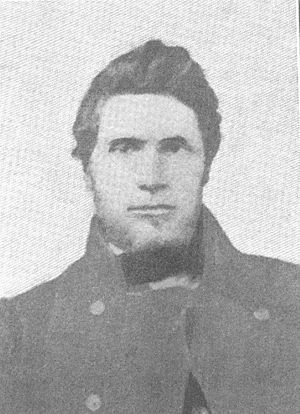Frisby McCullough facts for kids
Quick facts for kids
Frisby Henderson McCullough
|
|
|---|---|
 |
|
| Born | March 8, 1828 New Castle County, Delaware |
| Died | August 8, 1862 (aged 34) Kirksville, Missouri |
| Allegiance | |
| Service/ |
|
| Battles/wars | Siege of Lexington |
Frisby Henderson McCullough (born March 8, 1828 – died August 8, 1862) was a soldier who fought for the Confederate States Army during the American Civil War. He was executed by order of a Union Colonel named John McNeil after the Battle of Kirksville.
Early Life and Adventures
Frisby Henderson McCullough was born in New Castle County, Delaware. When he was 12 years old, his family moved to Marion County, Missouri.
In 1849, Frisby went to California during the exciting Gold Rush. He stayed there for five years, looking for gold. On November 26, 1856, he married Eloise Randolph in Marion County. They had three children together. One of their sons later became a lawyer in Edina, Missouri.
Military Service
When the American Civil War began, Frisby McCullough joined the Confederate forces. He served under General Thomas Green.
He took part in the Battle of Lexington. Later, in the spring of 1862, General Sterling Price sent him to northeastern Missouri. His mission was to recruit new soldiers for the Confederate army alongside Joseph C. Porter.
Working with Colonel Porter
During the summer of 1862, there was a lot of guerrilla fighting in Northeast Missouri. This meant small, unofficial groups were fighting. McCullough tried to convince Colonel Porter to focus only on recruiting. He wanted Porter to avoid fighting the Union forces directly.
One of McCullough's men, Joseph Mudd, said that McCullough worried about civilians. He feared that Union forces would get revenge on people who supported the South. This shows McCullough's caring nature. However, this idea also came from a Confederate point of view.
Before the battle at Kirksville, McCullough again advised Porter not to fight. He suggested sending their new recruits to Arkansas instead. There, they could get training and supplies behind Confederate lines. But Porter did not agree. McCullough then suggested they wait in the cornfields outside town. He thought this would be better than fighting inside the village. Again, his advice was not followed.
After the Battle
Frisby McCullough was captured after the Battle of Kirksville. He was wearing a Confederate officer's uniform. He was also acting under orders from General Price.
His execution was seen by many as unfair. People thought it was not needed or right. Some believed it actually made more people support the Southern cause.
 | Dorothy Vaughan |
 | Charles Henry Turner |
 | Hildrus Poindexter |
 | Henry Cecil McBay |

